This site was created specifically for people from Canada, for quick acquaintance with the gambling industry online. In today's article, you can know all about Signs that You Could be a Professional Gambler in Canada. Our Canadian visitors have asked us so many times to write the review of "Problem Gambling and Addiction in Canada, Signs that You Could be a Professional Gambler in Canada" because of high interest in this topic. Well, the thorough investigation by our gambling expert had been already finished and we have collected here all useful information about Signs that You Could be a Professional Gambler in Canada in one review. You may read it now!
Signs that You Could be a Professional Gambler in Canada
Blaming: "Work is really stressful at the moment and it doesn’t help that you are always on my back about xyz. " Agreeing: "Yeah you’re right I really should stop… This is the last time I swear."
Problem Gambling and Addiction in Canada

While most Canadians enjoy gambling responsibly, there are a small percentage of Canadian adults (3.2%) who struggle with moderate to severe gambling addictions. Those affected do not roll the dice for pleasure, but do so compulsively and irresponsibly.
If left unchecked this disorder can wreak havoc in the addict’s personal and professional lives. However, the pathological gambler can be difficult to detect, as, like other addicts, he will protect his addiction by disguising the severity of his behavioral problems and resulting negative consequences. This can make it difficult for loved ones to confront the issue, or even to detect that there is anything awry. It is crucial that mental health disorders are professionally treated before they lead to serious issues like depression, bankruptcy or suicide.
If are worried that yours or a family members’ gambling is starting to become more than a fun pastime, please seek professional assistance. See our full list of Canadian problem gambling resources at the bottom of the page. For more information on symptoms and causes of gambling addiction and who may be at risk, please read on.
What Is A Gambling Addiction?
Why do some people enjoy gambling as a pleasurable past time whereas a select few abuse the habit despite increasingly negative consequences? The reason is similar to why alcoholics keep drinking, smokers keep smoking and heroin addicts keep injecting. They are addicted.
Before 2013, pathological gambling was classified as an impulse compulsion in the DSM like pyromania, rather than an addiction. Recent studies in neuroscience and genetics have demonstrated that gambling rewires the neural networks in the brain in a comparable way to addictive drugs like cocaine. This is one of the factors that lead to the reclassification of the disorder and the overhaul in the way the disease is treated.
How Is It Defined?
- An addict craves their addiction
- They seem to act compulsively
- They cannot control the amount they use
- Despite negative consequences they continue their addiction
- They can’t stop thinking about their addiction or reduce their amount despite attempts to try
What Are the Warning Signs of a Gambling Addiction?
By the time individuals reveal themselves through their behavior to be an addict, they will have already caused significant harm to themselves or others. The abuser will feel a high degree of shame about their actions and try to eliminate all traces of their actions by lying, often even to themselves. Watch out for the following warning signs of the compulsive gambler:
Acting Secretively
If you find a loved one acting more shady and secretive than before, this should always ring warning bells. What is it they are ashamed of? What are they hiding? Keep a close eye on them, but don’t invade their privacy, as this will push them further away. Just ask considerate questions, perhaps they will open up.
Lighter Wallet Than You Remember
Where did it go? Were you really that careless with money this month? Didn’t think so. Keep a close eye on your money and keep a note of the amount of money that has gone missing. Let your loved one know you are aware of the theft, but don’t directly confront them unless you have hard evidence.
Defensive Behavior: Denial
People who are in denial often don’t realize they are lying and covering up their behavior as their own subconscious tries to hide the fact even from themselves. As a loved one, you should try to encourage the addict to face facts and seek professional help. Perhaps you notice the poker chips in their pocket and casually ask them when they were last at the casino. There are different types of denial reactions to look out for that can signify if a loved one has a problem.
Aggressive and Accusative Reactions
Blaming: "Work is really stressful at the moment and it doesn’t help that you are always on my back about xyz. "
Threatening: "See what happens if you bring that up again.” Or, alternatively, “You had better loan me that cash."
Guilt Tripping: "After all I’ve done for you, this is how you treat me? "
These reactions scream back off, and instinctively you will find yourself angry with the individual. They will skillfully redirect the focus towards your problems or to a lesser problem of their own, which they may apologize for to placate you. Alternatively, you will walk away and give them the silent treatment. Either way, these outcomes are preferable to the pathological gambler. Instead, remain calm regardless of how much they try to goad you into a negative reaction. You will soon see that the over reaction is paper thin.
Misdirection and Confusion Technique: Don’t Fall For It
Projecting: "Simona dragged me there again last night, she really needs to lay off the cards! Glad I’m not there as often as her."
Minimizing: "Oh, those are left over from when we went a few weeks ago, I don’t think I’ve been since then. That receipt says it’s from last night? Yeah I forgot, I only played a hand with my work buddies. "
Switching: "I have my vices. Who doesn’t in this awful world we live in. Capitalism has really messed us all up, hasn’t it?"
Joking: "I can stop gambling! I stop every time I change slot machines. "
Intellectualizing: "I’ve figured out the system, there’s a mathematical method to my madness, soon we’ll be rolling in it."
And The Most Dangerous Of All Denials…
Agreeing: "Yeah you’re right I really should stop… This is the last time I swear."
This is exactly what loved ones want to hear and have no problem with believing it every time. The fact is, the addict isn’t going to change without intervention and professional help.
Confronting the Addict: Intervention
Gather together friends and family who have been affected by the excessive gambling. The point of the intervention is not blame, but to get the afflicted person to seek professional help and to face up to their problem. The tone should be loving and encouraging, never confrontational or aggressive. The individual should feel safe to admit their problems and positive action should be taken that day, with the person’s permission. If at any point, you feel the sufferer is at risk of self-harm or suicide the contact the suicide prevention helpline 1-800-273-TALK (8255)
Take the Self Diagnosis Test
Has the above page started ringing some uncomfortable bells for you personally? Answer our self-diagnostic test to see if you may have a problem with pathological gambling.
- Do you feel guilty or have negative thoughts about gambling or the consequences of your gambling?
- Have you previously tried to cut down on time, money and energy spent on gambling and failed?
- Do you find yourself spending time & money on gambling that should be spent on other financial obligations?
- Do you spend inordinate amounts of time fantasising about the next time?
- Do you feel extreme highs and lows relating to gambling?
- Do you feel defensive and protective of your “habit”?
- Do you gamble to make yourself feel better?
- Have you found yourself taking risks or engaging in illegal activity to fund your ‘habit”?
- Have you found yourself surrounding yourself with “lower” people, because they make your own gambling seem normal by comparison?
If you answered yes to 2 or more of these questions, you are at a very high risk for gambling addiction and should seek professional help and assessment. Please see the list of local resources at the bottom of the page.
Positive Steps for Recovery
Now that this disease is better understood, more and more people are successfully recovering from gambling addiction. However, it is estimated that up to 80% of pathological gamblers never seek treatment for their problems. In order to recover, the addict needs to first confront the fact that he is an addict. With the help and support of friends and family, or even just a support group like Gamblers Anonymous, the individual can find their way to recovery. Positive lifestyle changes, like disassociating themselves from their previous detrimental associates and haunts, will aid the recovery process.
Avoiding Relapse
Once identified as an addict, the problem-gambler should eliminate gambling from their lives entirely. There is no such thing as “one more hand” for a pathological gambler. Talking with a debt recovery accountant and financial advisor will help alleviate the accumulated financial burden. Family members should allow the addict to take on the responsibility of their own debt and not bail them out. As difficult as it may seem, bailing out the compulsive gambler will enable the disease, making them more prone to relapse.
Canada

From among the numerous positive attributes that Canada boasts, one of our favorites is their stance on gambling and how they use the revenue produced from casinos, lotteries, sports betting and other wagering services to fund provincial and territorial programs to benefit their local communities. This page is designed to provide insight into the legal gambling options across Canada and to inform our readers about the laws and government agencies that regulate the gaming industry. Gambling laws vary from country to country around the globe, so it is important to stay informed before breaking any international law.
Is Gambling Legal In Canada?

Forms Of Legal Gambling In Canada
As mentioned above, gambling is regulated in Canada through the individual provinces. The provincial government agencies possess the authority to determine what legislation to enact to either allow or prohibit gambling operations in their community. Lawmakers also determine where the revenue earned from those services will be applied and what provincial or territorial public service they will fund. While some form of gambling is legal in all provinces and territories, not all areas allow the same forms of gambling entertainment. The specific regional regulations upheld in the province you reside in or visit will determine which gambling options are available in that area. Below is a list of each province and territory located in Canada, as well as the legally approved forms of gambling services that are regulated by the local governments and in operation at this time.
Alberta – Casinos, Lottery, Sports Betting
British Columbia – Casinos, Lottery, Horse Racing, Sports Betting
Manitoba – Casinos, Sports Betting
New Brunswick – Casinos, Horse Racing, Lottery, Sports Betting
Newfoundland and Labrador – Lottery, Sports Betting
Nova Scotia – Casino, Lottery, Sports Betting
Ontario – Casinos, Lottery, Sports Betting
Prince Edward Island – Casinos, Lottery, Sports Betting
Quebec – Casinos, Lottery, Horse Racing, Sports Betting
Saskatchewan – Casino, Horse Racing, Lottery, Sports Betting
Northwest Territories – Lottery, Sports Betting
Nunavut – Lottery, Sports Betting
Yukon – Casinos, Lottery, Sports Betting
Casinos – Revenue generated from casino licenses and fees often fund government assisted programs such as the free health care system and other local provincial or territorial programs. In the casinos, you are likely to find traditional games such as Slots, Baccarat, Roulette, Video Poker, Blackjack, Craps and more.
Poker – There are over 50 domestic casino locations offering poker tables across Canada. Canadians are permitted to play online poker since there are no laws that specifically outlaw it. Texas Hold’em is one of Canada’s most played poker games.
Lottery – Lotteries are set up by the provinces or territories and fund local community programs. Every province and territory has access to the lottery with most areas having access to multiple lottery games. Sports betting is tagged to lottery services across the provinces and territories.
Sports Betting – Sports betting is allowed across the board with a service known as Sports-Select, Pro-Line, Pari Sportif, or Sports Action. It is the same service with different names across the country. Tickets can be purchased at lottery centers in some provinces now accepting wagers online.
Horse Racing – Horse racing is immensely popular in Toronto. There are at least 5 tracks within the Toronto greater area. All tracks in Canada are located fairly close to the US border.
Forms Of Legal Online Gambling In Canada
Canadians have many options when it comes to betting online. Almost all the territories and provinces allow online betting, and some regulate their own online betting services. Canadian criminal code states that the Canadian government and/or its provinces must license all gambling businesses operating within the nation’s borders. While offshore gambling sites are not subject to Canada’s licensing requirements, we recommend that punters only consider those options that are legitimately licensed and regulated through a respected governing jurisdiction, such as the ones listed in this guide. Many Canadians prefer legally licensed offshore gambling sites for their more attractive bonus offers, better odds, a wider selection of wagering options and betting platforms, and of course, the convenience. According to the Canadian Gaming Association, it is estimated that Canadians wager about $4 Billion a year with offshore online betting sites and some of the more popular forms of online betting come from these services.
- Online Casinos
- Online Poker
- Online Sports Betting
- Online Horse Betting
- Online Lotteries
Important Canadian National Gambling Laws
Bill C290 – Bill C290 was intended to amend the Criminal Code to allow single sport game bets. The way it stands now is that Canadians may place parlay bets on sporting events through local sportsbooks. A parlay bet is a wager placed on the outcome of multiple events, and according to existing law, a minimum of 3 events qualifies for the parlay. The bill was submitted to the House of Commons but was eventually rejected. Had the bill passed, individuals could have placed a wager on just one game, match or event and won or lost the bet based on a single outcome.
Criminal Code 201 – CC201 states that anyone who keeps or operates a gambling house is guilty of a criminal offense and can face up to 2 years in prison. The same applies to anyone who is found in an illegal gambling house or leases, protects, or permits a place to be used as an illegal gambling house.
Criminal Code 202 – This code condemns illegal bookmakers, illegal betting and pool selling. It states that anyone caught placing a bet, accepting a bet or selling a pool bet is susceptible to legal action and could face up to 2 years imprisonment.
Criminal Code 206 – This code lays out punishments for anyone who frauds the lottery system or schemes games of chance. It details many different lottery scheme scenarios and deems them illegal under this code.
Criminal Code 209 – CC209 states punishment up to 2 years imprisonment for anyone who is caught cheating or has intent to defraud anyone or gambling service.
First Nations Gaming Act – A piece of legislation enacted by the First Nations government of Saskatchewan. Lays out an orderly procedure and economic development plan to be driven by the Saskatchewan Indian Gaming Commission.
Who Regulates Gambling In Canada?
Provincial or territorial gaming control boards regulate Canada’s gambling operations. Each province or territory has their own way of regulating games of chance and their own gaming regulators. They also have their own way of disbursing the revenue earned into government funds. Legal gambling options often pay for the Canadian free health care system, educational services, and other government-funded services. Below are the gaming commissions listed and the specific aspect of the gambling industry that they oversee.
Alcohol & Gaming Commission of Ontario – The AGCO is responsible for regulating the gaming industry and horse racing in the province of Ontario.
Alberta Gaming & Liquor Commission (AGLC) – The AGLC regulates the gaming industry in the province of Alberta. Revenue received from gaming activities is returned to the community by the means of licensed charities.
Atlantic Lottery Corporation – a Canadian organization that operates lottery games in Atlantic Canada. Owned jointly by 4 provinces: New Brunswick, Prince Edward Island, Nova Scotia, and Newfoundland and Labrador. Regulates casinos on Prince Edward Island.
British Columbia Gaming Policy / Enforcement Branch – The Enforcement branch regulates lottery games, casino games, online gambling, horse race betting in the province of British Columbia. Revenue generated from gambling is used to fund city services such as health care.
Department of Community Services – Permits charity games for the province of Yukon.
Kahnawake Gaming Commission – The Kahnawake Gaming Commission licenses and regulates interactive gaming, terrestrial poker rooms and raffles in the Mohawk territory of Kahnawake. Kahnawake is regarded as a sovereign nation operating in Canada’s borders but not under Canadian legal authority.
Liquor and Gaming Authority of Manitoba (LGA) – The LGA licenses gaming employees, products, and operations in the province of Manitoba.
Loto Quebec – Loto Quebec was founded in 1969 to oversee the activities surrounding games of chance in the province of Quebec.
New Brunswick Lotteries & Gaming Corporation – Oversees lottery schemes and responsible for the development and implication of the responsible gaming policy for the province of New Brunswick.
North West Territories Municipal & Community Affairs – Oversees the lottery system for the North West Territory. There are currently no casinos in the NW Territory.
Nova Scotia Provincial Lotteries & Casino Corporation – Regulates games of chance and lotteries and assures that 100% of the profits go back into the community to fund important programs.
Ontario Lottery & Gaming Corporation – Regulates casinos, lotteries and horse racing for the province of Ontario.
Quebec Alcohol, Racing and Gaming Commission – The board has supervision over casinos, horse racing and amusement machines for the province of Quebec.
Saskatchewan Liquor & Gaming Commission (SLGC) – The SLGC regulates gaming operations such as casinos, horse racing and charitable gaming in the province of Saskatchewan.
Service NL – Regulates charitable and non-profit organizations lottery fundraising events.
Legal Minimum Gambling Age
Minimum age requirements for legal gambling correspond with the legal drinking age mandated by the individual provinces and territories. Nineteen is the legal minimum gambling age at casinos throughout most of Canada, but 18 is the legal gambling age in Alberta, Manitoba, and Quebec.
Indian Casinos In Canada
The first Indian casino started operations in Toronto in the early 1990’s but in 1995 the First Nations Gaming Act was enacted to allow regulation of Indian casinos in the Saskatchewan province. By 1996, four more casinos had opened their doors. All casinos are charitable casinos and profits are put back into public funds. Today there are about 20 Indian casinos spread across 6 provinces.
Illegal Gambling Operations In Canada
Canada has a long history of illegal gambling operations that are still active today. Underground illegal gambling houses are in just about every major city throughout the country. These illegal gambling houses often feature illegal gaming machines and table games. Organized crime is often associated with these illegal gambling activities, so local task forces and provincial government agencies are especially looking to curtail these operations. In 2015, 33 illegal gambling houses were uncovered in the Toronto area and one raid even confiscated over $200,000. There have been raids reported in all major cities across Canada, but many of these illegal operations seem to be located in Toronto.
Do I Need To Pay Taxes On My Online Winnings?
No, the Canadian Income Tax Act states that unless someone is a professional and makes a living from gambling, they are not required to pay a tax or claim income on gambling winnings. The Minister of National Revenue states that individuals who consistently earn money from legal gambling and/or originates their primary source of income from gambling can be designated as a business and required to pay taxes on winnings.
Problem Gambling Help In Canada
How to Become a Professional Gambler

Have you ever thought about becoming a professional gambler? It might sound like a made-up profession, but far from it: it’s very real and it can be a very lucrative one at that. The question is: are you made up to be one?
Gambling for a living might seem like a dream come true, especially if you’re the type of person who enjoys placing bets on all kinds of things and making a bit of extra money on the side whenever you can. And while gambling carried a certain stigma and was once considered to be nothing more than a money-grabbing hobby, that is no longer the case – in fact, the growth of online gambling and the lack of taxes on betting wins has allowed gamblers to turn a profitable habit into a full-time career.
What’s rather interesting is that gamblers from northern, urban cities and London boroughs with high levels of unemployment have gambled more than four times the amount bet in richer rural areas in southern England, according to The Guardian. However, unemployment isn’t the only reason behind Britons’ gambling habits: like everyone else, they play online roulette for fun to win real money. And with lots of casinos now accessible online, it’s easier more than ever for them to bet on games like roulette, slots, bingo and other popular casino games from the comfort of their home.
An insightful survey of 4,000 adults conducted by the Gambling Commission shows that bingo and lottery draws are the most popular form of gambling across all ages, and that those who gamble on a weekly basis are more likely to place their bets online and, more specifically, on:
- Virtual dog or horse races
- Online casino games
- Virtual gaming machines in bookmakers
- Online bingo
- Fruit or slot machines
- Online spread betting
While you can certainly make a bit of money by gambling, it’s not that simple. It’s not all about luck, and you have to possess certain skills to ensure you perform better than your opponents. Here’s everything you need to know about becoming a professional gambler.
What is a professional gambler?
Experts say that there are six main types of gamblers. These are the professional gambler, the antisocial or personality gambler, the casual social gambler, the serious social gambler, the relief and escape gambler and the compulsive gambler.
Unlike the others, however, professional gamblers take their hobby very seriously and like to think of it as a profession. They decide beforehand which games to play, they follow a specific strategy and they are always in control of the amount of money and time they spend gambling. They never go over the line and they always take carefully calculated risks. Professional gamblers are not addicted to gambling, even though there is a high chance of becoming compulsive gamblers if they make gambling the number one priority in their daily lives. Ultimately, in order for someone to be able to call themselves a professional gambler, they should approach betting as a job rather an act of fulfillment.
Why become a professional gambler
For those who want to become insanely rich without putting in all the hard years of work – which goes for the majority out there – becoming a professional gambler might actually be a good idea. However, we should warn you that working in the betting industry, just like in any other career field, has its pros and cons.
For one, gambling as a full-time job is a great career option if you want to set your own working hours as it allows you to enjoy activities that you wouldn’t normally be able to with a 9-to-5 job. Another great advantage is that there is no tax to pay on either bets or any subsequent winnings in the UK. But that’s not all: you get to be your own boss, which means you get to enjoy more freedom in what you do and be totally independent.
Then again, gambling can be a dangerous passion to have as it poses a great threat to your financial and personal life. It might seem like a fun and easy thing to do, but many people often end up losing everything: from money to their homes and even their families. Faith Freestone, the managing director at Gordon Neighbourhood House, says that ‘professional gamblers talk about being in control but the problems start when gambling controls you.’
This means that when you start seeing gambling as a ‘full-time job’, there should be strict limits in terms of the pace of your work to help you ensure that you get to enjoy a healthy work-life balance.
Job description
So, what does a professional gambler do exactly? Your ‘responsibilities’ as a professional gambler depend on what you choose to gamble on. For example, most of the workday for professional sports gamblers is spent watching games and perusing stats. Gambling on horse racing, on the other hand, would require watching horse racing competitions, doing a bit travelling here and there, conducting some research into the sport itself and, of course, coming up with a working formula before placing your bets.
Working hours
If the 9-to-5 work schedule doesn’t work for you, you will like the idea of becoming a professional gambler. As you can imagine, there are no set working hours for you – just like freelancers, you get to set your own hours.
The only difference with gambling as a profession is that you have to choose whether you should play in a casino or online. If you are an internet gambler, you can work at any time you wish (or when there are available sessions online for poker and other card games), whereas when visiting casinos, you would work during the most unsocial hours of the day (or night, considering that most British casinos close at 4am).
Salary
While you won’t be earning a salary per se, the potential earnings as a professional gambler are huge. However, this largely depends on how often you gamble, how good you are at it and how much you gamble, meaning how high your stakes are.
Brad Byers, a professional sports gambler, says that your salary actually depends on how often you win. If you don’t have any other source of income, it might be extremely difficult to make a living out of gambling because it doesn’t guarantee a set amount of money each month. Becoming a professional gambler requires that you are comfortable with financial instability. Meanwhile, Byers says that you must win 52.4 per cent of even-money bets just to avoid losing money and closer to 55 per cent year-round to earn a worthwhile living.
Education
Believe it or not, you can actually get a degree in gambling. Some educational institutes across the UK – like Salford University, for example – offer gambling studies as a second subject in a course that is combined with Business, Economics and Finance. That’s exactly what Michael Cain did. In an interview with Times Higher Education, Cain revealed he and his peers study gambling ‘from an academic point of view. Most of the course comprises business economics, but there are also lectures on the psychology and sociology of gambling and the effect of gambling on society as well as sessions on government regulation of the industry. Two visiting experts from Las Vegas come over to give lectures as well.’
The casino industry fully backs the Salford programme which is designed to produce a higher grade of casino staff including managers and inspectors. Gambling, which has become part of a course in economics, teaches students the ‘art of betting’ through chance and the science of probabilities. It offers them seven three-day sessions in full-time study, lessons on the history of gambling and development of the industry, business strategy, marketing, market competition and so on.
In addition, there are many courses available in roulette, blackjack and other games within the gambling industry, and it’s apparent that it is becoming more popular within educational settings. Students interested in gambling could also get to learn more about casinos through a specialist gambling academy located at Blackpool and The Fylde College, which is earmarked for a possible super-casino.
Skills and qualities needed
Professional gambling requires a variety of personal qualities that few people possess. Some of the most important ones include precision money management and meticulous record-keeping, and those hoping to pursue a career as a professional gambler would do well to master the following:
- Strong research skills
- Time management skills
- Stress management skills
- Emotional control
- Persistence
- Patience
- Dedication
- Strong memory
- Concentration skills
- Problem solving/analytical skills
- Being comfortable with adversity
Professional development
Just like any other career, however, you have the chance to continue your professional development while staying current on gambling practices. By becoming a member of the Society for the Study of Gambling, you can gain access to resources associated with the profession. The society organises two annual meetings on gambling which are held under the Chatham House Rule, with discussions on a range of topics regarding regulation, research and statistics, social responsibility and other aspects of gambling activity.
One of the most important things about becoming a professional gambler is that you will have to keep your gambling activity under control. If you love betting and you often find yourself at a casino, you might want to consider this profession – and who knows? You might just become a billionaire poker player!
Would you consider becoming a professional gambler? Join the conversation below and let us know what you think!
10 Signs of Gambling Addiction

Call 800-926-9037 to speak with an alcohol or drug abuse counselor. Who Answers?
Last updated: 10/25/2018
Author: Addictions.com Medical Review
Compulsive gambling is often referred to as a “silent killer” simply because an addiction to gambling does not always readily stand out. The signs of gambling addiction are often overlooked as something else such as a desire to play games, an urge to win money or anything but a compulsive disorder that is out of control. Often times, the desire to gamble is so strong and the addiction is so serious that severe personal and social consequences, even death, can result.
It may be difficult to recognize the signs of gambling addiction for one reason or another. According to the US National Library of Medicine, chronic gamblers often lead seemingly normal lives but in the background, there is a serious problem at hand. Eventually, the addiction will cause destructive outcomes and there will be no mistaking the signs of gambling addiction; at that point, the biggest concern will be where to find help.
1. Obsession with Gambling

Stealing in order to gamble is a sign of addiction.
One of the most common signs of gambling addiction is the obsession that comes with it. Gambling addicts are obsessed with gambling and may be preoccupied with gambling to a point in which they don’t care about anything else. Compulsive thoughts about gambling or gambling obsessively to a point in which it causes other problems in your life are just a few of the common signs of gambling addiction.
2. Unable to Stop Gambling
Have you tried to quit gambling, made an honest commitment to quit and failed? If you are unable to stop gambling despite your desire to do so, you could be a gambling addict. The inability to quit even when you want to is one of many signs of gambling addiction that most addicts tend to immediately overlook or write off as something else.
3. Gambling Despite Consequences
Has gambling caused problems in your life such as financial difficulties, loss of a job or relationship problems? Many addicts and their loved ones tend to overlook even the most prominent signs of gambling addiction such as those which are present when excessive gambling is causing consequences in life and yet the individual continues to gamble anyway.
4. Psychological Withdrawal when NOT Gambling
Sometimes, the signs of gambling addiction are very similar to the signs of other addictions such as a drug or alcohol addiction. Psychologically, when a gambling addict is not gambling, he or she may be irritable, depressed or restless. These are all signs of emotional withdrawal which results when an addict is obsessed with gambling and has a perceived “need” to gamble in order to be happy.
5. Gambling to Improve Happiness
Do you or does someone you know seemingly gamble in order to be happy or have fun? If gambling is a necessary component of your happiness or elevated mood, there’s a good chance that gambling addiction is to blame. This is one of many commonly overlooked signs of gambling addiction that both addicts and those who are close to them tend to mistake for some other problem. Gambling to mask problems, feel happy or otherwise improve your emotions is a sure sign that there is a bigger problem at hand.
6. Stealing or Otherwise Breaking the Law to Gamble
An addict will often break the law in order to have the money that they need to gamble or to recover their losses. Stealing, committing fraud or otherwise breaking the law to fuel the habit are all signs of gambling addiction that should not be overlooked and which could lead to greater consequences including jail time or probation.
7. Denying that there is a Problem
Denial is a common sign of addiction and to state that there is not a problem when there really is happens to be common ground amongst addicts. If you suspect that a loved one has a gambling problem and you have hard evidence to back it up yet he or she continues to deny the problem, it could be time to seek professional help.
8. Financial Problems
One of the most prevalent signs of gambling addiction is financial problems that result from the compulsive gambling disorder. A friend may all off a sudden have problems with his or her personal finances or they may ask to borrow money often. Compulsive gamblers depend on others to provide them with money either to gamble or to pay expenses because they lost their money gambling.
9. Mood Swings
Compulsive gambling, especially when the gambling takes place as part of a double life in which friends and family are unaware, can lead to excessive mood swings. Mood swings are often overlooked or mistaken for upset that is not the result of the addiction but most often, mood swings are one of the signs of gambling addiction that should be spotted early on.
10. Hiding Gambling Behavior
As compulsive gambling progresses, and the addict comes under scrutiny from his or her friends or family members, it is not uncommon for the addict to begin hiding gambling behaviors. Hiding the behavior is one of the more common signs of gambling addiction and also one that’s really hard for outsiders to spot because they don’t know what’s going on—but for the addict, recognizing that it’s wrong to hide behaviors from loved ones is a step in the right direction when it comes to finding help for a compulsive gambling disorder.
Tips on How to Become a Professional Gambler
Qualifications
- Discipline: If you have to make a bet for the sake of making a bet you are in trouble.
- Focus: If you are distracted with other activities, people, family or problems you will not be able to give gambling the attention it requires.
- No Superstitions: I personally do not know anyone who is superstitious and successful at the same time.
- Record Keeping: Show me someone who does not keep records and I will show you a loser.
- Ego: I've seen this be the downfall of what otherwise may have been a good professional gambler. Until you have won 10 million or more gambling, check the ego at the door. If you have reached this level of success than why the need for the ego.
- Emotions: This one is key. You must not let the highs and lows affect you. If you cannot do this than you need to find another profession. Examples of the bullshit I've heard ten thousand times. The ref made a bad call. The stupid jockey judged the pace wrong. Some dumb ass took MY card. Why did or didn't they go for the 2 point conversion. If you are or want to be a professional gambler this is going to happen everyday, SO FORGET ABOUT IT. If you can't handle it you have almost zero chance of success.
- Pull the Trigger: When you have the advantage you must be able to make the appropriate bet. If you look at money in terms of what it could buy you, you're in the wrong business.
- Bankroll: First you need to have one. What you can borrow on your visa card does not count.
- Bankroll or Money Management: There are some good books on this subject. If you do not know what I mean by money management you need to buy such book. Hint: You cannot play 50-100 stud on a $10,000 bankroll. You cannot bet $5000/game on a $50,000 bankroll. You cannot play a $5 video poker machine on a $100,000 bankroll. If you try this you are not a professional gambler you are just a gambler who will go broke sooner rather than later.
- Maths: This will win you more money than any other single factor. If you don't know the math than you better learn it or at least know someone who will do the math for you. If you don't like math than find another occupation.
- Adversity: As in any endeavor there comes adversity. Be emotionally ready to handle it because it is a sure thing. You will be barred from casinos, cheated and stiffed during your career, that I can promise you.
- Be true to yourself: Resist the temptation to do things that are detrimental to your well-being and your bankroll. Going on tilt, drug use, and binges will have a negative affect on your ability to perform. Even a bad diet will have a negative affect. Whatever form of gambling one embraces it always gets down to who's brain is functioning the best, who has the bankroll, who knows the math.
- Reputation: To me this is everything. Without a good reputation you will never be a professional gambler in my eyes. You may win money, but doing it without honesty and integrity you're just a bum to me. If you win by cheating, scamming or stiffing people you're not a professional, you're a cheat, scam artist or stiff. A good reputation will become your greatest ally in the war to win. Once you establish a good reputation opportunities are everywhere. Other professionals welcome the chance to work with you, help you, and partner up with you. Having a good reputation does not mean keeping your word 9 out of 10 times, it means 100% of the time keeping your word. I know a professional poker player in Las Vegas who did not do the right thing 25 years ago and to this day nobody will have anything to do with him. Once you sell your reputation you can never buy it back.
To be a professional it takes a rare mix of qualities not found in most people. As one well known professional poker player likes to say "Its a hard way to make an easy living". To be a professional at anything it takes a unique person and gambling is no exception.
Expectations
- When first starting out you should be buying all the books you can read on the aspects of gambling that interest you. The gamblers Book Club in Las Vegas is a great place to start. The internet now offers more opportunity for learning than anything I've ever seen in my life. Gambling conferences are a great place to cut your teeth also. I personally don't attend these functions for personal reasons not because I don't think they are helpful. Las Vegas used to be the Mecca for most professional gamblers but with the internet and opportunities in other locals this is no longer as true but still a reasonable place to make new contacts and a place to hone ones skills. The advantage of Las Vegas is that you can acquaint yourself with other pros, learn from both their soft and hard skills. If you're starting from scratch though and first need to learn the basics of the games then there's definitely an advantage to first practicing online, on demo play.
- Expect both positive and negative flux in your bankroll. If you decide to be a professional blackjack player you will at some point lose 60 top bets during your career. If you play long enough you will have a losing year. If sports are your choice, expect to go 2-22 on a busy college Saturday at some point. If you never seem to flux up or down you are doing something wrong. If your emotions cannot take flux you need to pick a different profession. If you enjoy flux this could be a bad sign also. When your bankroll fluxes upwards this is not the time to buy that fancy car you have always dreamed about. There will be plenty of time for all of that but until you have a substantial bankroll (at least 500K) you will need to preserve capital. Things can go bad in a hurry in this business and you need to be prepared to weather the storms.
- Expect to put a huge time investment into gambling. It is not uncommon to put 80+ hours/week. To be successful this is a business that will take over all aspects of your life. Once you get established and secure with yourself than you can cut back on the time investment but many guys still choose not to.
- If you have the ability to make more money doing something else you probably should stick to something else. This business can be an emotional roller coaster and the only thing (in the long run) to justify it is the extra money.
Realities of the Business
You have no bosses or customers to speak of so you are totally independent of the bull shit most people go thru in a normal day. This is the good part. The only person that you need to answer to is yourself. Don't bullshit yourself or you will become a bad boss. Be true to yourself.
You produce no product or service that society requires. This is the bad part. As you become more successful your purpose in life becomes more meaningless. While other guys are saving lives, producing goods and services you are not much better than a parasite to society. With success comes (a feeling of) a debt you owe to your fellow man. Most successful gamblers I know give heavily to charity; donate their time and money to help their fellow man in some small way. I believe it is their way to make up for the empty feeling one gets from years and years of not producing something of substance. Many successful gamblers look for something else to do with their lives after becoming financially independent. Relationships don't work for most of us early on in our career so this is another avenue many professionals look to achieve as they become financially successful.
The content of this site is copyright 2016 Financial Spread Betting Ltd. Please contact us if you wish to reproduce any of it.
Qualities of a Professional Gambler
I'm often asked what it takes to become a successful high-stakes gambler. "Do I have what it takes?" people want to know. It's difficult to answer this question, because no matter how well I think I know someone, I don't know him well enough to be able to make this assessment. The only person who can possibly do that is the one asking the question, and then only if he is brutally honest with himself.
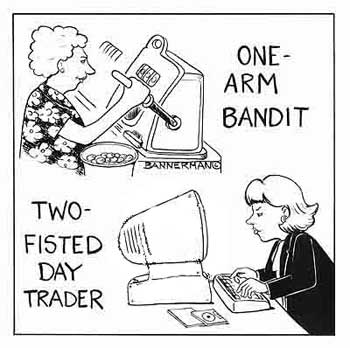 |
Many writers make winning at gambling sound easy. Don't believe them. I'm here to tell you flat out that becoming a professional big-time gambler is a grueling and psychologically demanding process. The reason I use the word 'process' is that the successful gambler is constantly evolving, adapting, and changing as circumstances dictate. He is perpetually evaluating opportunities, weighing risk/reward ratios, and exercising proper discipline. Most importantly he must have a high tolerance for ambiguity.
For the professional gambler, the coming day's outcome is never clear. Although he knows he has the best of it, on any given day he can't depend on winning. Every professional gambler, whether he's a blackjack or poker player, a sports bettor, or a horse handicapper, will inevitably have losing streaks. If you play as long as I have, some of those losing streaks will be horrendous. I once had 14 consecutive losing weekends at a major Las Vegas Strip hotel playing blackjack in a good double-deck game. I lost 1,458 units in the space of 3 Ѕ months. Had I not had so much success prior to this streak, I'm that even I would have started questioning whether blackjack was a profitable game. It didn't seem so at the time. I checked and rechecked my tables. I carefully studied each losing session, reviewing the dealers, the playing conditions, my betting patterns, and so forth. Was I pressing too hard? Was I steaming? Was my bet spread adequate? Did I still have a positive mental outlook? Was there something in my personal life I was bringing with me to the tables?
I methodically rules out each variable. The only thing I could pinpoint was that my confidence had decreased to the point where I wondered if I would ever win there again. This being the case, I took a break - not from blackjack, but from playing at this particular casino. For the next couple of months I played my blackjack trade elsewhere (while turning down several juicy invitations to special events at my nemesis casino). I won steadily and my confidence returned.
Then I revisited the casino from hell. In the end I won more money at that joint than at any other. Playing at least six days a month for a couple of years, I remained completely unmolested. Even though I consistently booked large wins, the casino personnel never forgot that losing steak. They believed it was only a matter of time before it happened again. And they were right. Had they waited long enough, as long as a lifetime, it's likely such a losing streak would have repeated itself. As it turned out, my wins were so overwhelming that upper management finally sat up and took notice. Scrutiny increased dramatically, and when a pit-boss friend of mine tipped me off to the fact that my days there were numbered, I left for greener pastures.
I was lucky. Very lucky. Not lucky to have won back all my money plus a lot more - the laws of probability controlled that outcome. No, I was luck that I'd had enough experience, and had made enough money prior to encountering this gambling nightmare, that I was prepared to deal with its financial and psychological consequences. Even then it was damned difficult. Had it happened early in my career, I surely would have been wiped out financially. Psychologically, would I have had the will to raise a new stake and try again? That's hard to say. It's a rhetoric question, but I believe I would have pressed on. The mathematics of the game are so compelling that ultimately logic would have prevailed and I would have continued playing.
But the point is this: Every player, regardless of how skilled he is and how good the playing conditions are, will eventually have a gut-wrenching losing streak. Probably several. The laws of probability mandate these losing streaks just as surely as they also mandate that you'll win overall. I'm not just talking about a couple of losing trips; I mean real carnage to both bankroll and psyche. How you deal with it when it happens will determine whether you've got what it takes to be a pro.
Big-time winners tend to have certain traits in common. To be sure, not every top pro possesses all these characteristics, but lacking any of them represents a weakness that will probably cause trouble at some point in their careers. Following is a list of these critical traits:
- High interpersonal competence
- A positive attitude toward gaming and life
- Soft-focus concentration
- Likableness, charm
- High tolerance for ambiguity
- Ability to detect micro-expressions
- Highly observant and alert
- Slow to anger
- Good table presence
- Self-confident - slow to doubt own abilities
- Disciplined and controlled
- Flexible, adaptable, resilient
- Take good care of boy and mind
- Maintains proper diet
- Avoids alcohol and drugs
- Self-effacing - ego needs under control
Although most of these traits are self-explanatory, a few words of clarification are in order for several.
High Interpersonal Competence
First and foremost is interpersonal competence, which means a person's skills in interacting with others. The most successful gamblers I know are open, friendly, charming, and well-liked. They go out of their way to avoid offending others. They are highly tolerant of other viewpoints and they avoid arguing. They are also good listeners.
People like knowing that someone has really heard what they've said. By using active listening techniques, the skilled communicator paraphrases what another says, so the speaker knows he's been heard correctly. It doesn't matter if the skilled listener agrees or not; by being able to accurately state another person's position, he ingratiates himself. Let me give you an example.
Suppose someone is going on about how cruel it is that people in some cultures eat dogs. Whether you agree with this statement or view this practice as a cultural issue to be resolved by the indigenous people has no bearing on how you apply your skills as a listener. You might say something like, "You'd like me to know that the practice of eating dogs seems repugnant to you. You view it as cruel and inhumane and in your opinion it should be prohibited." Notice that you've neither agreed or disagreed with the statement. You have, instead, clearly articulated the person's position, so he knows he's been heard.
You'll be amazed how effective this technique is in casino situations. Dealers regularly complain to me about floor personnel, and floor personnel complain to me about casino managers. I listen to their beefs so they know they've been heard, without condemning or condoning what they say. Because they do not feel threatened or put down, they usually continue to open up to me. I often hear about their personal situations, even about other job offers they are considering - dangerous stuff to be bantering about in their current job setting. Of course, I never betray any confidences.
Also, I never offer gratuitous advice. If I'm asked for advice, I demur. "Well, I'm not sure," I'll say. "What do you think the best approach would be?" Then I switch back to listening mode, giving them the opportunity to hear what they're saying, which enables them to refine their thinking and find their own action path. The key here is that the problem is theirs, and I help them think through possible solutions without volunteering answers.
People are remarkably grateful for someone who will listen to them. This technique goes a long way toward cementing solid relationships with casino personnel, which are as important now as always.
In addition to sophisticated listening skills, the successful gambler possesses what has been called "table presence". He smiles readily, has an open posture, and alertly leans forward. He makes eye contact with the other players and casino personnel, nods while listening to others talk, and lightly touches others on the arm when appropriate. To help you remember of these qualities, think of the acronym S-O-F-T-E-N:
- Smiling
- Open posture (arms and legs uncrossed)
- Forward learning
- Touching (briefly and lightly)
- Eye contact
- Nodding while listening
With practice these qualities can be developed. In blackjack they will help you enormously in your interaction with casino personnel. In poker you will be better liked and more respected, more welcome in private games, and more in control in public games.
What Does it Take to Be a Professional Gambler?

Casino gaming, online or not, has always been seen as a form of hobby or a great way to kill some time off. Many people would play casino games because they are bored or they just really have the money to spend on it. Some would only gamble in cities like Las Vegas and Atlantic City because it is a tourist activity.
Now, have you ever wondered whether this can be something that could bring you great income? Gambling has always been fun and exciting, but can it be more than a hobby? The answer to that is a straight YES!
While many only see gambling as a form of having fun, there are a few people out there who heavily rely on this to make a living. For them, their Betwinner registration isn’t just to add some fun to how they follow and watch sports. It’s simply their way to make more money.
You’re probably thinking that anyone can turn gambling into a career. It could be true to a certain extent. If this is something you’re after, you need to know that it’s not just all about gambling or placing bets on a daily or weekly basis.
To be considered a professional gambler, at least 60 percent of your income should come from this activity. However, that should also mean that you can support your basic needs from the money you’re getting from gambling.
This means that you should be able to pay for your rent, utility bills, buy food, clothes, and support your lifestyle with gambling. Yes, you can still have another source of income. In fact, that is advisable because what’s true is that gambling is a risky career. You should have a back-up plan in case you don’t succeed in it.
Okay, so you’re probably already intrigued and excited about turning gambling into a career. Don’t rush it, however. There still are a few things that you should know. You may have seen plenty of movies that inspired you to be a professional gambler, but one of the first few steps in getting rid of those movies in your thoughts. It’s rarely like the movies, we assure you that.
You need to start fresh and inspired. There are quite many ways for you to earn money from gambling. You need to choose which way you’re most comfortable in and capable of. You can be a poker player, a card counter, a value bettor, or a matched bettor.
Here are two of the most common ways to earn money by gambling.
Playing Poker and Other Table Games
It’s all about poker if this is what you choose. You’ll basically play poker a lot and so it’s important that you know how the game works and that you come up with your own strategies. Playing poker is not all about luck. It’s important that you have the skills to be able to control the result of the game.
The truth about playing poker is that it’s not all about becoming a better competitor. It’s about understanding how much you’ll make in playing. What’s hard to be able to cover the rake. This is the commission that casinos take from each hand.
As a career, you can also start competing in tournaments. It takes time and a lot of skills, but most of the time, the prize in such tournaments are worth it. There are still other table games that you can play professionally. You can choose Blackjack or Baccarat. It’s really up to you. Go for the game that you know a lot about.
Sports Betting
This is the go-to of many who’d really like to earn good money when it comes to gambling. It’s all about strategies and analysis. Sure, it can be hard to predict the outcome of many sports events, but this is easier to understand and it doesn’t rely on pure luck.
Some of the popular professional sports bettors out there are Jaromir Jagr, Pete Rose, and celebrity rapper 50 Cent. These people make a lot of money by betting on sports.
Betting professionally should be taken seriously You shouldn’t just rely on your gut and you shouldn’t wager on athletes or teams just because they are the favorites. It’s important that you follow the sports you’re wagering on and that you’re updated on the latest news about them.
Whatever it is that you find out, always think of how this could affect the game. Track your betting progress and identify what went wrong with the bets that you placed and what you did right whenever you win. Again, this requires heavy analysis. When taken seriously, you can make a lot of money from sports betting.
Hello, I am a professional writer, with more than 10 years of writing experience. I love to write on science-related subjects and share knowledge with my readers. I hope all my reader friends will enjoy my work.
Famous Canadian Gamblers
Traditionally Canada has not been known for its gambling culture. Over recent years though with the poker craze going wild, together with a government adopting less rigorous regulation on gaming than its neighbor, it’s slowly become one. We’ve gathered a list of the top 20 Canada-based online and offline gamblers (who were either born or immigrated to Canada), and wrote a bit about their fascinating life stories.
Feel free to share the list, and send us additional suggestions via our contact form. Aspiring to become professional gamblers? Read this.
1) Guy Laliberté
Born in Quebec City, Quebec (1959).
Type of Gambler: Professional Poker Player
Why does he deserve a spot on this list: Guy is a late bloomer in the poker world because he ironically spent the majority of his life forming Cirque du Soleil. In April 2007, he won $696,220 at the Bellagio in Las Vegas. What makes his poker career legendary is that he also gives make winnings to charity.
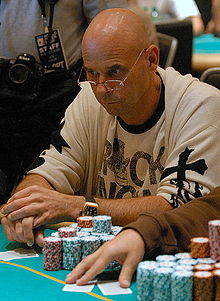
That being said what really made Laliberté the respected philanthropic gentleman that he is, was his Big One charity outreach in which he bought in $1 million dollars for charity in the 2012 World Series of Poker. Part of these proceeds were donated to the One Drop Foundation. A total of 48 players played with a total donation of $5,333,328 for charity.
2) Evelyn Ng
Born in Toronto in 1975
Type of Gambler: Professional Poker Player both live and online.
Why She Deserves a Spot on This List: Since 2010, her total live tournament winnings has exceeded $375,000. She became famous in 2003 after beating several American poker players including: Annie Duke, Jennifer Harman, and Kathy Liebert. She also dated Daniel Negreanu for a time.
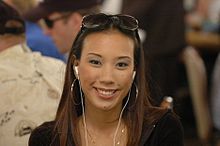
Find Out More:
3) Daniel Negreanu
Born in: Toronto, Ontario (1974).
Type of gambler: Professional poker player – online, and off-line in both tournaments and cash game.
Why does he deserve a spot on the list: The most accomplished Canadian poker player with 6 WSOP bracelets, 2 WPT wins, and Card Player Magazine player of the year for 2004.
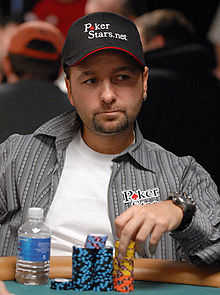
Beyond his tremendous success on the live felt, he has also done remarkably online, which has won him a place of honor as the most recognizable representative in Team Poker Stars (https://www.pokerstars.uk/team-pokerstars/daniel-negreanu/).
Find out more:
4) John Lefebvre
Born in: Calgary in 1951.
Type of Gambler: Primarily online sector.
Why Does He Deserve a Spot on This List: John Lefebvre deserves an “administrative spot” on this list in that he started his empire first in other business ventures. However, he founded NETeller – the premiere online money transfer facility for the online gambling sector. He is also perhaps the only person on this list who has been arrested.

Find Out More:
5) David Baazov
Born in Israel in 1980. He was raised in Montreal, Quebec.
Type of Gambler: Online Gambling
Why He Deserves a Spot on This List: Baazov is currently the CEO of the Amaya Gaming Group, which is the largest online gambling company in the world. He made Canada a powerhouse in the industry when when he purchased Full Tilt Poker and PokerStars the two largest online poker rooms. In 2014, Forbes published an article about Baazov calling him the young king of online gambling.
Short Bio: One of six children Baazov was born into an Orthodox Jewish family in Israel. He moved to Canada when he was one and excelled in mathematics in school. He became disinterested with Judaism at 16 and upon telling his parents was thrown out of the house. He received his big break when he received a large project to work with computers in Montreal’s public library for $20,000,000. At this point, he decided to get into software development and created an electronic poker table that allowed people to play poker without a human dealer. This is how Amaya was born and has continued to make Baazov enough capital to purchase his stake in the online gambling business.
6) Calvin Ayre
Born in: Lloydminster, Canada in 1961.
Type of Gambler: Mainly an online gambler.
Why He Deserves a Spot on This List: The founder of Bodog, he also purchased slots.com for a record $5,500,000 price.
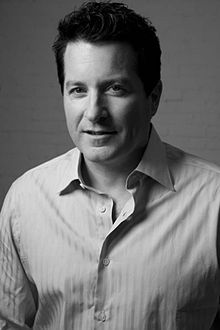
Short Bio: Ayre is known for his outlandish public behavior and for being a bold businessman that adores making headlines. Some call Ayre the original king of Canadian online gambling as he started Bodog, now one of the top online gaming sites in the industry. Ever since Forbes published an article on his extravagant purchasing style in 2006, Ayre presence has soared.
Find Out More:
7) Michael McDonald
Born in Ontario in 1989.
Type of Gambler: Live Poker Player and online.

Short Bio:McDonald started playing poker in the 11th grade. He began making his money online and quickly earnt enough to buy a Lamborghini. He won his first tournament at 18 and now at 24 is a leading player at live poker tournaments.
8) Mike Watson
Born in St. John’s in 1984
Type of Gambler: Online Poker Player and Live Poker Player.
Why He Deserves a Spot on This List: Mike gained popularity in 2008 when he won $1,630,000 at the Bellagio Cup. He boasts $6,700,000 in lifetime table earnings.
Short Bio: Mike has made a great deal of money at both online and live tournaments. As of 2014, the total amount of money that he has won in live tournaments is $7,200,000. Additionally he finished 3rd in the European Poker Tour with a cash out of $422,750, and in 2016 he won the first event of the European Poker Tour.
More Information:
9) Gavin Smith
Born in Ontario in 1968.
Type of Gambler: Live Poker Player.
Why He Deserves a Spot on This List: Smith’s expertise is Texas Hold’em. He has won and ranked quite impressively in many poker championships around the world and has won several poker bracelets. His earnings overall exceed $5,300,000 without his TV appearances.
Short Bio: Smith began playing poker at the age of 26 with his parents. Shortly after, he became a poker dealer and began to compete in tournaments. He quickly built enough of a bankroll to put his career as a taxi driver and golf course caretaker aside to win several world poker tournaments.
In May 2005, he won first prize in the World Poker Tour of $1,128,278. He placed 471st in the 2005 World Series of Poker and 592nd in the 2007 World Series of Poker. Additionally, he earned his first WSOP bracelet in the Mixed Hold’Em $2,500 Event.
Find Out More:
10) Sorel Mizzi
Born in Toronto in 1986.
Type of Gambler: Online and Live Poker player.
Why He Deserves a Spot on This List: He boasts winnings greater than $2,600,000 in live poker winnings. He placed 15th at the World Poker Championship at the Bellagio in 2007.
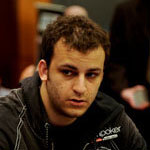
Find Out More:
11) Robert Cheung
Born in Hong Kong in 1970. He then moved to Vancouver.
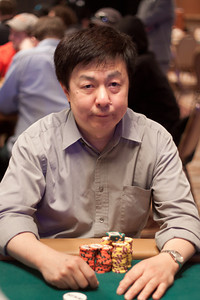
Type of Gambler: Online and Live Poker Player.
Why He Deserves a Spot on This List: He earned a WSOP bracelet by beating Richard Murnick in a legendary poker match and has since earnt roughly $1,500,000 in live winnings with his online winnings exceeding $2,000,000.
Short Bio: Robert Cheung made headlines when he beat Richard Murnick, whilst his real notoriety came when he created an infamous online screen name called “Runninggreat.” He is known for being the first player to beat an opponent in three consecutive hands in live tournaments. In recent years, Cheung has fostered his online presence more than his live poker winnings.
Find Out More:
12) Jonathan Duhamel
Born in Boucherville, Quebec, Canada in 1987.
Type of Gambler: Live Poker Player.
Why He Deserves a Spot on This List: Duhamel is best known for winning the $8,900,000 WSOP prize in 2010.
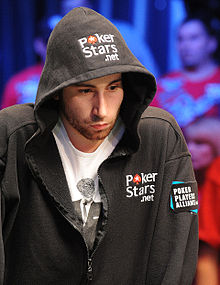
Find Out More:
13) Brian Molony
Born in Toronto.
Type of Gambler: Live Poker Player and Embezzler Extraordinaire.
Why He Deserves a Spot on This List: Even though many of the gamblers have been above board on this list, sadly there is still some crossover between poker and the criminal world – the reason why Molony is the poster child for the Canadian gambler gone rogue.
Short Bio: Brian Molony is infamous for embezzling millions from the Canadian Imperial Bank of Commerce, the second largest bank in Canada to satisfy his gambling habit. On the outside Molony was a cheap man who barely tipped at restaurants; however, he was busy embezzling $10,200,000 to gamble on his weekends. He created a shell company to deposit money to Las Vegas Casinos to pay his debt at the gambling tables. Molony was finally caught at Caesars Atlantic City Hotel-Casino and pleaded guilty to embezzlement in 1983. Later a movie about his exploits was created called ”Owing Mahowny”.
14) Shawn Buchanan
Born in Vancouver, British Columbia
Type of Gambler: Online and Live Poker Player
Why He Deserves a Spot on This List: Buchanan won the World Poker Tour with a cash out of $768,775. In 2011, he was on the leader board among the world leaders of the poker players of the year point rankings.
Short Bio: Buchanan made a name for himself in the poker world when he won his first tournament in 2007 with a cash out of $768,775. Since then, he has made major waves in both the online and live poker world. Some of his more top stats are: acquiring live tournament winnings in excess of $4,450,000 and placing in the top 10 on both the 2010 and 2011 WSOP. Additionally, Buchanan has become an online poker guru online with his screen name of “buck21” on PokerStars. His highest cash out with that screen name has been $97,262 for the first place.
More Information:
15) Brad Booth
Born in Vancouver, British Columbia in 1976.
Type of Poker Player: Online and Live Poker Player.
Why He Deserves a Spot on This List: In 2009, his live poker tournament winnings exceeded $710,000. Additionally, he has appeared on Poker After Dark.
Short Bio: Booth made a name for himself by appearing in High Stakes Poker and Poker After Dark. Soon after, he went by the nickname of “Yukon Brad” in the poker world. Booth was involved in a scandal in which he was supposedly cheated out of $2,000,000. Since this transpired he has been on a losing streak that many poker observers believe is the end of his career. That being said Booth had a top career for fourteen years and was praised for being one of the best poker players in the world by Phil Hellmuth.
More Information:
16) Isabelle Mercier
Born in Victoriaville, Quebec in 1975
Type of Gambler: Live Poker Player
Why She Deserves a Spot on This List: Isabelle is a unique pick as first started out as a lawyer going to the Université de Montréal before getting a Master’s Degree in Paris. To fund her studies she worked as the Poker room manager at the Aviation Club de France and learned a few tricks of her own, mainly, how to win!
Short Bio: Isablle Mercier is one of my favorites on this list giving up a secure career as a lawyer and beating men at poker! She first turned heads when she won the 2004 World Poker Tour for the $25,000 cash prize and was given the nickname “No Mercy.” Since then, she won 10th place at the 2005 European Poker Tour in Monte Carlo and won the PokerStars Ante Up For Africa Charity Tournament in Monte Carlo in 2009. Mercier has made several documentaries and was recently hired by BetClic as a consultant for their online betting site.
More Information:
17) Mark Radoja
Born in Guelph, Ontario, Canada in 1985.
Type of Gambler: Live Poker Player
Why He Deserves a Spot on This List: Radoja possesses live tournament winnings exceeding $1,500,000.
Short Bio: Radoja has won a great deal of his earnings at the WSOP. To date he has won two WSOP bracelets: $5,000 No Limit Hold’em – Shootout for $436,568 and $10,000 No Limit Hold’em – Heads-Up for $336,190. What makes Radoja a candidate for this list is that of his $1,500,000 in reported winnings, an impressive $1,469,638 has come from the WSOP.
More Information:
18) Monica Reeves
Born in Hamilton, Ontario, Canada in 1972
Type of Gambler: Professional Blackjack Player
Why She Deserves a Spot on This List: Her live tournament Blackjack winnings exceed $40,000 and she is endorsed on a CBS Blackjack tournament show.
Short Bio: Monica is a former fashion model who began her poker career in 2005. She was tutored by the industry expert Jim Worth. What got her noticed was when she placed 114th in the Aruba Classic. Her fame further increased when she won a big Blackjack Tournament televised by CBS called the Ultimate Blackjack Tour. This landed her a number of TV endorsements.
19) Jamie Staples
Born in Calgary, Alberta, Canada in 1991
Type of Gambler: Online and Live Poker Player
Why He Deserves a Spot on This List: Jamie Staples carved himself a niche in low-stakes poker, which maked him a major player for PokerStaples. Jamie Staples is a rising poker star to keep an eye on.
Short Bio: Jamie Staples got his fame by specializing on low stakes online poker for Twitch.tv. Jamie Staples is a young celebrity to watch with his career just beginning to blossom. He was voted the largest poker streamer in 2016. He is just beginning to dabble in the live poker tournaments and has won $9,000 to date. However, he also already won winnings to exceed $550,000 on his online poker tournaments. It is likely that we are going to see a lot of Jamie Staples in the future.
More Information:
20) Peter Jetten
Born in Toronto, Ontario, Canada in 1985.
Type of Gambler: Online and Live Poker Player.
Why He Deserves a Spot on This List: To date, he has over $2,000,000 in live poker tournament winnings and just received an endorsement deal from Full Tilt Poker.
Short Bio: Peter Jetten won his first online poker tournament while he was attending the University of Ontario. He decided to drop out of school early to pursue his poker career. This proved to be a great investment for Jetten as he finished 8th at the WSOP Tournament in 2006. In 2008, he placed 2nd to Marty Smyth in the $10,000 World Championship Pot Limit Omaha Event which had a cash out of $500,000. Shortly after, he earned 4th place in the High Roller Event of European Poker Championships in London for $300,000.
Peter Jetten’s impressive career was bolstered by his remarkable online success. In 2004, he placed two bets totaling $75 and turned that $75 into $100,000 in one year. To date, he has netted $650,000 in online tournaments. It is likely that we will see even more success from Jetten in the future.
More Information:
That concludes our selection of the 20 most famous Canadians gamblers. Be sure to check other popular pages on our website. If you’re looking to start playing online, check out our beginners guide and find the top Canadian casinos on our homepage.
So, let's define, what was the most valuable conclusion of this review: Gambling Addiction In Canada - Easy guide to understanding and diagnosing gambling addiction, with a list of useful problem gambling resources & websites. at Signs that You Could be a Professional Gambler in Canada
Contents of the article
- Problem Gambling and Addiction in Canada
- What Is A Gambling Addiction?
- How Is It Defined?
- What Are the Warning Signs of a...
- Defensive Behavior: Denial
- Aggressive and Accusative Reactions
- Misdirection and Confusion Technique:...
- And The Most Dangerous Of All Denials…
- Confronting the Addict: Intervention
- Take the Self Diagnosis Test
- Positive Steps for Recovery
- Avoiding Relapse
- Canada
- Is Gambling Legal In Canada?
- Forms Of Legal Gambling In Canada
- Forms Of Legal Online Gambling In Canada
- Important Canadian National Gambling...
- Who Regulates Gambling In Canada?
- Legal Minimum Gambling Age
- Indian Casinos In Canada
- Illegal Gambling Operations In Canada
- Do I Need To Pay Taxes On My Online...
- How to Become a Professional Gambler
- What is a professional gambler?
- Why become a professional gambler
- Job description
- Working hours
- Salary
- Education
- Skills and qualities needed
- Professional development
- 10 Signs of Gambling Addiction
- 1. Obsession with Gambling
- 2. Unable to Stop Gambling
- 3. Gambling Despite Consequences
- 4. Psychological Withdrawal when NOT...
- 5. Gambling to Improve Happiness
- 6. Stealing or Otherwise Breaking the...
- 7. Denying that there is a Problem
- 8. Financial Problems
- 9. Mood Swings
- 10. Hiding Gambling Behavior
- Tips on How to Become a Professional...
- Qualifications
- Expectations
- Realities of the Business
- Qualities of a Professional Gambler
- High Interpersonal Competence
- What Does it Take to Be a Professional...
- Famous Canadian Gamblers
- 1) Guy Laliberté
- 2) Evelyn Ng
- 3) Daniel Negreanu
- 4) John Lefebvre
- 5) David Baazov
- 6) Calvin Ayre
- 7) Michael McDonald
- 8) Mike Watson
- 9) Gavin Smith
- 10) Sorel Mizzi
- 11) Robert Cheung
- 12) Jonathan Duhamel
- 13) Brian Molony
- 14) Shawn Buchanan
- 15) Brad Booth
- 16) Isabelle Mercier
- 17) Mark Radoja
- 18) Monica Reeves
- 19) Jamie Staples
- 20) Peter Jetten
No comments:
Post a Comment
Note: Only a member of this blog may post a comment.